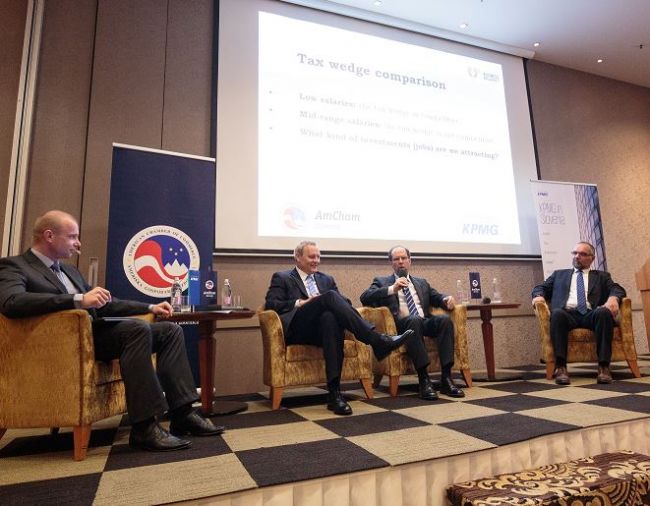Slovenia has the potential to become a reference country. Unfortunately, educated young people are opting to go abroad. We need to make the Slovenian business environment more attractive for them so that they will bring their experience and knowledge back. Let’s shift the way of thinking and strengthenSlovenia’s position on the investment map. Are we ready to make a leap further?
In his opening address, Dušan Mramor, Dr.Sc., Minister of Finance of the Republic of Slovenia and European Finance Minister of the Year for 2016, emphasised the following: “We were very successful last year in terms of public finances, as we reduced the deficit from 4.9% in 2014 to 2.2% in 2015.” Minister Mramor spoke of prodcutivity challenges. Among the measures in the aforementioned area are the consolidation of the banking system through a reduction in the number of banks, development projects in the new financial perspective, improved access to financing for small and medium-sized enterprises, an active employment policy and the modernisation of the tax system.
Minister Mramor highlighted the importance of healthcare and pension reform saying, “Now is the time to secure long-term investments. Measures are needed today to achieve results after 2020.” We need more flexibility on the labour market and must increase employment. “We must reduce study period. Now is the time for changes, as new jobs are being created and there will be even more in the future,” according to Mramor. In the area of taxes, Minister Mramor said, “The first results of the increased efficiency of tax collection through the use of fiscal cash registers will be seen in May. We are working to reduce administrative burdens, while a great debate is opening in terms of tax restructuring: should we be implementing tax restructuring or lowering taxes? Tax revenue in Slovenia is below the EU average. We thus cannot lower taxes, but must restructure them and ensure stable and predictable general government revenues.” He concluded by saying, “The tax burden on labour is a major problem. We are competitive with low wages, but not with high wages. We must focus on high added value, and be competitive in the segment of high wages.”
Matej Potokar, General Manager Customer Service and Support (CSS) – Western Europe, Microsoft, said, “Tax restructuring would be a major step forward. What’s missing in the public debate is where we can do more. Slovenia should decide in which area it wants to be the best. The earnings of engineers and developers represent an important issue. We have to create an environment that will bring young educated people back to Slovenia, where they can put their knowledge and experience from abroad to good use. Slovenia needs foreign investors and they are more than welcome here.”
Vojmir Urlep, MSc, President of Lek’s Management Board emphasised that Slovenia must introduce a development cap as soon as possible, as this will be less painful for the country: “I understand the current political reality and that it is difficult to move things forward. But that will soon be necessary. We must be realistic in terms of why investors invest in Slovenia. Not because of a market comprising two million people, but because of the people themselves. There will never be a low-cost business environment in Slovenia. Technology is extremely important. We need additional competences and experts in our economic environment. We need the best talent in different sectors: “Slovenia must become more attractive, even for foreign experts. We are competitive in terms of gross wages, but not in terms of net wages. This is the reason experts do not want to come to Slovenia.” Mr Urlep believes in Slovenia’s potential as a reference country: “We have potential. Let’s stop dreaming about greenfield investments because I don’t believe they will come to fruition. Perhaps only in niches. The only path to secure investments is privatisation. We should privatise what we can and thus create additional jobs. We have to change our way of thinking as a society and stop being hostile to foreign investors. Until we change our way of thinking, we will never be a reference country.”
“When large multinationals leave, we lose more than jobs; we also lose our place on the international business map, as well as a business network,” said Matej Potokar and added, “When a company assesses the potential of a country, it also looks at its tax system and activities carried out to attract foreign investors. We need to create a friendly business environment. Slovenia has many references, good leaders and superior providers of technology. But we still need foreign investors so that Slovenia will develop even further. A development cap is generally an important positive signal for foreign investors.”
“Tax restructuring is not enough to prevent the departure of young educated people and to attract those back who have already left. What is important is the entire environment. We were the most successful country in the EU at reducing youth unemployment, from 21.5% in 2012 to 15% today. We need to continue in that direction,” added Minster Mramor on the subject of brain drain.
“The introduction of a development cap is required for the development of human resources. We need to begin talking about this and establish a timeframe for implementation. It is not a question of whether we will introduce a cap, but primarily how and what benefits it brings in terms of the creation of jobs,” said Žiga Vižintin, Co-Chair of AmCham Finance Committee and adviser to the Management Board of Pokojninska družba A.
Minister Mramor concluded by saying, “We must make a great leap, but society is not yet ready for that. Changes in Slovenia are therefore introduced gradually.”
Photo gallery is available HERE.

AmCham Business Breakfast. Networking with content.
Sponsor:
